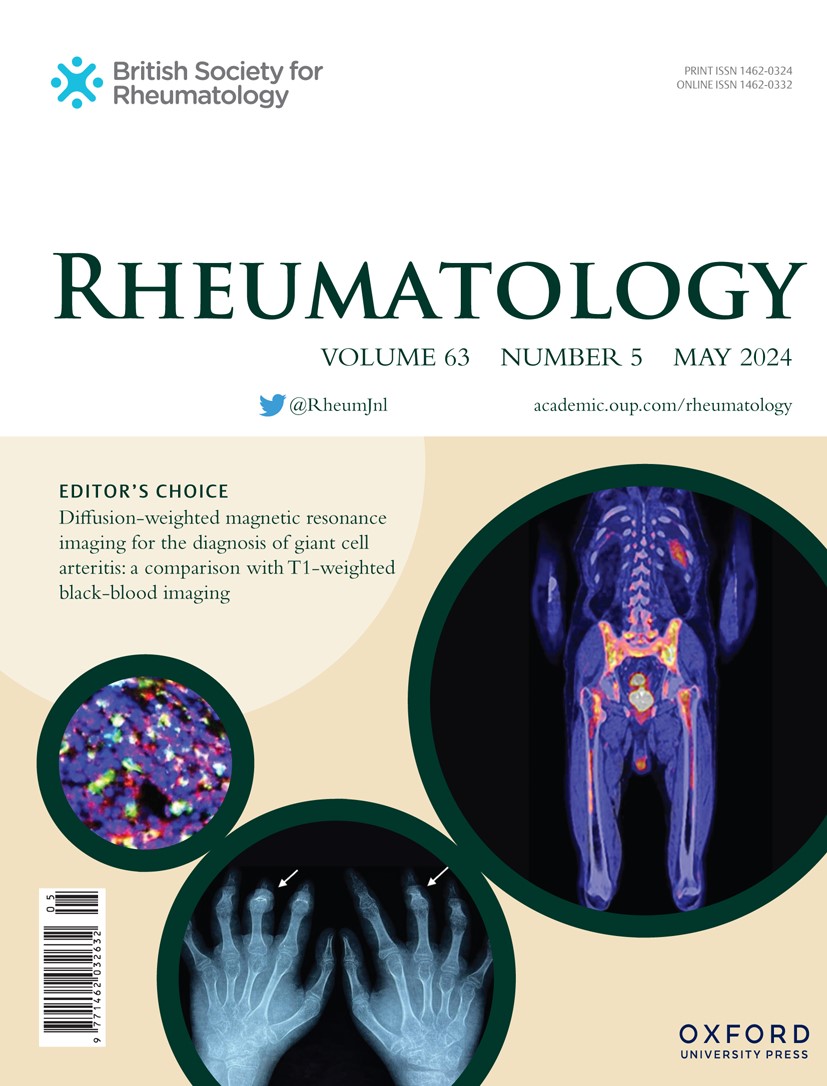超短时间糖皮质激素治疗巨细胞动脉炎后托珠单抗单药治疗的疗效:三年随访
IF 4.7
2区 医学
Q1 RHEUMATOLOGY
引用次数: 0
摘要
GUSTO(超短糖皮质激素(GC)和托珠单抗(TCZ)联合治疗GCA)试验旨在评估新发GCA患者在接受3天GC脉冲治疗后52周的TCZ单药治疗的疗效和安全性。本研究数据显示GUSTO方案3年以上的维持效果和复发后再用TCZ治疗的有效性。方法采用单臂、单中心、开放标签临床试验,18例新诊断的GCA患者连续3天静脉注射500 mg甲基强的松龙,然后从第3天至第52周进行TCZ单药治疗。临床缓解的患者在第52周停止使用TCZ。维持疗效包括在第208周疾病完全持续缓解的患者比例。结果纳入时的中位年龄为72岁(四分位间距67-75岁),15/18的患者主诉有颅内症状。第52周,13/18例患者无复发缓解,进入随访研究。在72周、187周和200周时,有2/13例患者出现轻微复发。两例患者在重新开始TCZ单药治疗后均获得缓解。在第208周,11/18的患者保持无复发缓解;11/13患者的无药缓解持续156周。结论除2例进入长期延长期外,其余患者均维持无药缓解。这一复发率大大低于随机对照试验报告。患者特征(仅为新诊断)和密集的初始治疗可以解释持续的缓解。本文章由计算机程序翻译,如有差异,请以英文原文为准。
Efficacy of tocilizumab monotherapy after ultrashort glucocorticoid administration to treat giant cell arteritis: three year follow-up
Objectives The GUSTO (GCA treatment with Ultra-Short glucocorticoids (GC) and TOcilizumab (TCZ)) trial was set up to evaluate the efficacy and safety of a 52-week TCZ-monotherapy after a 3-day GC-pulse in new-onset GCA. The presented data show the maintenance effect of the GUSTO protocol over 3 years and the effectiveness or retreatment with TCZ after relapse. Methods Eighteen patients with newly diagnosed GCA received 500 mg methylprednisolone intravenously for 3 consecutive days followed by TCZ monotherapy from day 3 until week 52 in a single-arm, single-center, open-label clinical trial. Patients in clinical remission stopped TCZ at week 52. Maintenance of efficacy included the proportion of patients with complete lasting remission of disease at week 208. Results Median age was 72 (interquartile range 67-75) years at inclusion and 15/18 patients complained of cranial symptoms. At week 52, 13/18 patients were in relapse-free remission and entered the follow-up study. Minor relapses were observed in 2/13 patients at weeks 72, 187 and 200. In both patients, remission was achieved after restart of TCZ monotherapy. At week 208, 11/18 patients stayed in relapse-free remission; 11/13 patients remained in drug-free remission for 156 weeks. Conclusion Drug-free remission was maintained in all but two patients entering long-term extension. This relapse rate is substantially lower than reported in the randomized-controlled trials. Patient characteristics (exclusively new diagnoses), and the intensive initial treatment may explain the lasting remission.
求助全文
通过发布文献求助,成功后即可免费获取论文全文。
去求助
来源期刊

Rheumatology
医学-风湿病学
CiteScore
9.40
自引率
7.30%
发文量
1091
审稿时长
2 months
期刊介绍:
Rheumatology strives to support research and discovery by publishing the highest quality original scientific papers with a focus on basic, clinical and translational research. The journal’s subject areas cover a wide range of paediatric and adult rheumatological conditions from an international perspective. It is an official journal of the British Society for Rheumatology, published by Oxford University Press.
Rheumatology publishes original articles, reviews, editorials, guidelines, concise reports, meta-analyses, original case reports, clinical vignettes, letters and matters arising from published material. The journal takes pride in serving the global rheumatology community, with a focus on high societal impact in the form of podcasts, videos and extended social media presence, and utilizing metrics such as Altmetric. Keep up to date by following the journal on Twitter @RheumJnl.
 求助内容:
求助内容: 应助结果提醒方式:
应助结果提醒方式:


